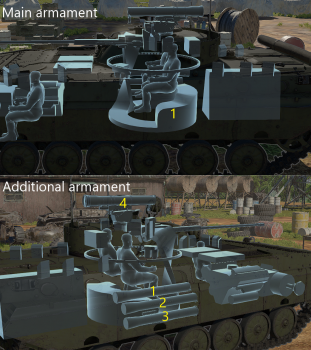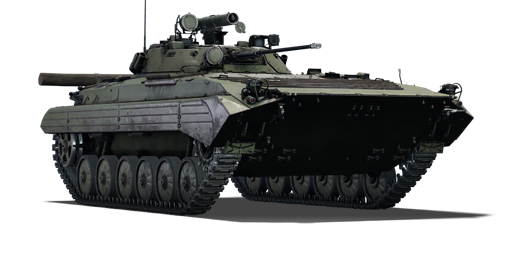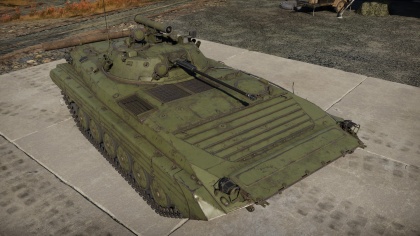BMP-2
Contents
| This page is about the Soviet light tank BMP-2. For the version equipped with a 73 mm cannon, see BMP-1. |
Description
The BMP-2 is a rank Soviet light tank
with a battle rating of (AB), (RB), and (SB). It was introduced in Update 1.81 "The Valkyries".
General info
Survivability and armour
BMP-2:
The BMP-2 armour layout consists of mostly High Hardness Rolled Armour. The front plate and turret armour is sufficient to stop anything short of a small auto cannon. The sides are generally resistant to machine gun fire, although larger calibre rounds such as those fired from the 12.7 mm .50 calibre machine guns on many American tanks can penetrate the side and rear of the BMP-2. Depending on where it is hit, the BMP-2 is generally not very survivable due to the low crew count. Having only 3 crew means that if any penetrating round kills 2 of them, you are dead. Some shots might hit empty space, but you should not rely on it. Generally it is best practice to be very careful when driving the BMP-2. Even if you have disabled the enemy vehicle's main cannon, they may still be able to damage you with their heavy machine gun. The BMP-2 also suffers from hullbreak, it will be destroyed by 105 mm chemical and 120 mm solid rounds if they hit any component.
BMP-2D:
The BMP-2 has optional add-on armour which improves its resistance to heavy machine gun and some light cannon fire from the sides and rear of the turret, at the cost of losing its amphibious ability. This armour means that you are safe from enemy tanks once you have disabled their main gun. This modification has little effect on the hullbreak mechanics of the BMP-2.
Mobility
| Game Mode | Max Speed (km/h) | Weight (tons) | Engine power (horsepower) | Power-to-weight ratio (hp/ton) | |||
|---|---|---|---|---|---|---|---|
| Forward | Reverse | Stock | Upgraded | Stock | Upgraded | ||
| Arcade | Expression error: Unexpected * operator. | 465 | Expression error: Unexpected round operator. | __.__ | |||
| Realistic | 265 | Expression error: Unexpected round operator. | __.__ | ||||
The BMP-2's mobility is reasonable, albeit not excellent, at a maximum of 72/65 km/h (AB\RB) on-road, however, the vehicle's acceleration and off-road performance leave something to be desired.
The BMP-2 can swim at 7 km/h.
Armaments
Main armament
The Shipunov 2A42 30 mm Autocannon is a very versatile weapon - it is possible to change its fire rate based on the situation and it has vertical guidance of +74 degrees, which makes it effective not only against tanks but for planes and helicopters as well.
The main concern with this powerful main weapon is the ammo capacity. The gun has two firing modes - relatively slow (~200/minute) and extremely fast (~550/minute), while your ammo capacity is 500. To not run out of ammo during the battle, one should use full auto mode only when facing certain doom, or when sitting in an ambush position against an unknown enemy.
Its reload rate for the belts is quite fast at 1.15 seconds and it gets a choice of HEF-T, AP-T, and HVAP in belts. Every belt is universal and has at least 1 AP and 1 HE in them, HE belt carrying 2 of HEF-T for 1 AP-T per cycle.
The HVAP belts have enough penetration to obliterate lighter tanks such as Leopard A1A1s, AMX-30B2 BRENUS and Warrior frontally, however, when engaging other larger targets it's only possible to completely defeat them from the side, though you can still cripple enemy tanks frontally by shooting cannon barrels and tracks.
The main difference of the HVAP compared to the APDS of other autocannon-equipped vehicles is that it is very bad against angled tanks and when attacking tanks on high ground (Refer to the table, to see how bad it can get). Because of that, targets usually easily dealt with such as the Striker may deflect fire from your main gun when heavily angled. When facing something the main gun cannot deal with, you'll need to use the secondary weapon:
| 30 mm 2A42 | Turret rotation speed (°/s) | Reloading rate (seconds) | ||||||||||||
|---|---|---|---|---|---|---|---|---|---|---|---|---|---|---|
| Mode | Capacity (Belt) | Fire rate | Vertical | Horizontal | Stabilizer | Stock | Upgraded | Full | Expert | Aced | Stock | Full | Expert | Aced |
| Arcade | 500 (340) | 550 | -4°/+74° | ±180° | Two-plane | 28.6 | 39.5 | 48.0 | 53.1 | 56.5 | 1.3 | 1.1 | 1.1 | 1.0 |
| Realistic | 17.9 | 21.0 | 25.5 | 28.2 | 30.0 | |||||||||
Ammunition
- Default: AP-T · HEF-I*
- 30 mm HE: HEF-I* · AP-T · HEF-I* · HEF-T*
- 30 mm APT: AP-T · AP-T · AP-T · HEF-T*
- 30 mm HVAP: APDS · APDS · APDS · APDS · HEF-T*
| Penetration statistics | |||||||
|---|---|---|---|---|---|---|---|
| Belt | Penetration @ 0° Angle of Attack (mm) | ||||||
| 10 m | 100 m | 500 m | 1,000 m | 1,500 m | 2,000 m | ||
| Default | 65 | 62 | 50 | 38 | 29 | 22 | |
| 30 mm HE | 65 | 62 | 50 | 38 | 29 | 22 | |
| 30 mm APT | 65 | 62 | 50 | 38 | 29 | 22 | |
| 30 mm HVAP | 82 | 81 | 79 | 75 | 72 | 69 | |
Ammo racks

| Full ammo |
1st rack empty |
Visual discrepancy |
|---|---|---|
| 2 | 0 (+2) | No |
Additional armament
BMP-2 also has an ATGM launcher. Its guidance system is semi-automatic, so it's easier to use in RB. It is a default modification on the vehicle, unlike the BMP-1, so doesn't need to be researched.
The ATGM is able to penetrate most tanks BMP-2 will face at its BR and often above when aimed well. The 9M113 is also fairly useable at range, although it generally won't reach sniping helicopters. The BMP only has 4 ATGMs, so it's a good idea to be stringent with them.
4 x 9M113 ATGM
- Guidance type: SACLOS
- Firing range: 3 km
| 9M113 Konkurs ATGM | Turret rotation speed (°/s) | Reloading rate (seconds) | |||||||||||
|---|---|---|---|---|---|---|---|---|---|---|---|---|---|
| Mode | Capacity | Vertical | Horizontal | Stabilizer | Stock | Upgraded | Full | Expert | Aced | Stock | Full | Expert | Aced |
| Arcade | 4 | -5°/+15° | -15°/+37° | N/A | 28.6 | 39.5 | 48.0 | 53.1 | 56.5 | N/A | N/A | N/A | N/A |
| Realistic | 17.9 | 21.0 | 25.5 | 28.2 | 30.0 | ||||||||
Ammunition
| Penetration statistics | |||||||
|---|---|---|---|---|---|---|---|
| Ammunition | Type of warhead |
Penetration @ 0° Angle of Attack (mm) | |||||
| 10 m | 100 m | 500 m | 1,000 m | 1,500 m | 2,000 m | ||
| 9M113 | ATGM | 600 | 600 | 600 | 600 | 600 | 600 |
| Shell details | |||||||||
|---|---|---|---|---|---|---|---|---|---|
| Ammunition | Type of warhead |
Velocity (m/s) |
Projectile Mass (kg) |
Fuse delay (m) |
Fuse sensitivity (mm) |
Explosive Mass (TNT equivalent) (g) |
Ricochet | ||
| 0% | 50% | 100% | |||||||
| 9M113 | ATGM | 205 | 14.50 | 0.0 | 0.1 | 2,750 | 80° | 82° | 90° |
Ammo racks

| Full ammo |
1st rack empty |
2nd rack empty |
3rd rack empty |
4th rack empty |
Visual discrepancy |
|---|---|---|---|---|---|
| 4 | 3 (+1) | 2 (+2) | 1 (+3) | 0 (+4) | No |
Machine guns
7.62 mm PKT is only useful for destroying light obstacles to avoid losing momentum. Alternatively, it can be used to mark the enemy in Realistic battle. Using it for anything else is pointless, as your 30mm is far more effective otherwise, and the 7.62mm won't cause damage to anything but early aircraft or open-top vehicles with exposed crew.
| 7.62 mm PKT | ||||
|---|---|---|---|---|
| Mount | Capacity (Belt) | Fire rate | Vertical | Horizontal |
| Coaxial | 2,000 (250) | 700 | N/A | N/A |
Usage in battles
The BMP-2 is best played as a light support vehicle, avoiding being a primary target. Where possible, spot opposing vehicles for teammates while staying near heavier friendly vehicles, helping repair and support them as necessary. By staying mostly in cover and near more threatening targets, you'll avoid being a target yourself.
The BMP isn't particularly fast for a light tank, but if you are able to move into a position that enemy tanks will be passing you'll be able to make quick work of them with the 30mm gun.
The BMP is somewhat vulnerable to aircraft fire, particularly larger cannons will make quick work of the vehicle through its near non-existent top armour. Where possible, find positions with good overhead cover or minimal visibility for overhead aircraft (beneath over-arching rocks, near or in buildings, under dense tree cover). If for any reason you do become the target of a strafing run, don't be afraid to fire back - the 30mm will make quick work of most aircraft, and in head-on engagements is particularly easy to get on target.
Modules
| Tier | Mobility | Protection | Firepower | |||
|---|---|---|---|---|---|---|
| I | Tracks | Parts | Horizontal Drive | 30 mm APT | ||
| II | Suspension | Brake System | FPE | NVD | Adjustment of Fire | Airstrike |
| III | Filters | Crew Replenishment | BMP-2D | Elevation Mechanism | 30 mm APDS | |
| IV | Transmission | Engine | ESS | Smoke grenade | Artillery Support | Improved optics |
Pros and cons
Pros:
- Can easily destroy other light vehicles with both its main gun and its ATGM launcher
- At times is surprisingly survivable, the vehicle's internals are largely non-critical components
- Can ford rivers/canals to get to locations that are normally difficult or sometimes impossible to reach
- Somewhat effective as an AA with fast-firing 30 mm
- ATGMs will comfortably destroy almost any vehicle with a well placed missile
- 30 mm HVAP can quickly disable tracks/gun barrel on any target
Cons:
- The 30 mm HVAP is not as powerful as APDS on other AFVs
- 30 mm HVAP has extremely bad angled performance
- Small maximum ammo load, can only take a single HVAP belt
- Can hull break, although some modules can prevent it
- Vulnerable to HMGs and light cannons at close ranges, particularly without add-on armour
History
Development
After the Yom Kippur War, it became clear that the armament of the BMP-1 was proven to be insufficient, as well as the protection. Egyptian and Syrian BMP-1's had been knocked out by 12.7 mm (.50 in) machine gun fire through the sides and rear. The BMP-1P was developed in order solve some of the problems with the BMP-1, but a new model was needed. Work began on creating an improved version of the BMP-1, called the BMP-2.
Design
The hull of the BMP-2 was nearly identical to the hull of the BMP-1. The armour was unchanged - other than the side armour which could now withstand 12.7 mm machine guns - as was the shape of the hull itself. The turret, on the other hand, was of a new design. It was the same general shape as the turret of the BMP-1, but it was much larger. The commander sat to the right of the gun breech and the gunner sat to the left of the gun breech. The main armament consisted of a 2A24 30 mm autocannon, with a secondary armament of a co-axial 7.62 mm machine gun, with some models receiving a 40 mm automatic grenade launcher. There is also a 9M111 and 9M113 anti-tank guided missile (ATGM) launcher on the roof of the turret. There were some other differences as well. The infantry hatches on the roof of the troop compartment was reduced to 2 from 4. In addition, only 7 infantry soldiers could be carried, instead of the 8 that could be carried by the BMP-1. The BMP-2 was also heavier than the BMP-1, but received a more powerful engine, and as such had similar mobility to the BMP-1.
Production and Service
The BMP-2 entered service in 1980, and it is unknown how many have been produced. It is thought that at least 20,000 BMP-2 have been produced so far, but some estimates have the total production at up to 35,000. These numbers are for the Soviet/Russian military alone, not including license built copies or export models. BMP-2's have seen combat in a number of conflicts, although not so much as the BMP-1 as it entered service later.
BMP-2D
The BMP-2D was an upgrade package that could be installed on a regular BMP-2. It consisted of applique armour on the sides of the vehicle and under the driver and commander positions, and 6 mm of applique armour on the turret. It also added the ability to attach a mine clearing device on the front of the vehicle. Because of the added weight of the upgrade package, the BMP-2D was not amphibiously capable.
Devblog
The arrival of the BMP-1 infantry combat vehicle in the Soviet Army greatly increased the firepower and mobility of infantry formations on the battlefield. However, there were also significant shortcomings, mainly in the armament department. The 73 mm Grom gun, which was installed on the BMP-1 wasn't particularly efficient against infantry units, tanks and low flying air targets. In addition to this, the flight of the trajectory became impossible to predict if even a small crosswind was present. To account for these issues, a decision was made to create a new vehicle based on the BMP-1 with the automatic rifled gun. Among the several projects carried out, the vehicle designed by Kurganmashzavod engineers was acknowledged to be superior to the rest. The BMP-2, which was put into service in 1977, had a similar design to the BMP-1 in terms of the layout and general configuration. However, the turret underwent significant changes. It now had space for two crew members – the gunner and the commander, and the automatic 30 mm 2A42 gun became its primary armament. Just like its predecessor, the BMP-2 was fitted with a launcher capable of firing either the Konkurs or Fagot anti-tank guided missiles, which the vehicle could deploy when engaging tank units. The vehicle was regarded as fairly successful, and over the years of its service, the BMP-2 underwent a series of modernizations and modifications directed at improving the vehicle's defences and increasing its destructive capability. The BMP-2 remains in service till now and is in great demand abroad.
Media
Skins and camouflages for the BMP-2 from live.warthunder.com.
See also
Links to the articles on the War Thunder Wiki that you think will be useful for the reader, for example:
- reference to the series of the vehicles;
- links to approximate analogues of other nations and research trees.
External links
Bibliography
- David B. (2016, December 12). BMP-2. Tank Encyclopedia. https://tanks-encyclopedia.com/coldwar/USSR/BMP-2.php
- BMP-2. (2020, April 27). In Wikipedia. https://en.wikipedia.org/w/index.php?title=BMP-2&oldid=953499108
| USSR light tanks | |
|---|---|
| T-26 | T-26 · T-26 (1st Gv.T.Br.) · T-26-4 · T-26E |
| BT | BT-5 · RBT-5 · BT-7 · BT-7 TD · BT-7M · BT-7A (F-32) |
| T-50 | T-126 · T-50 |
| T-70 | T-70 · T-80 |
| PT-76 | PT-76B · PT-76-57 · Object 906 |
| BMP | BMP-1 · BMP-2 · BMP-2M · BMP-3 |
| BMD | BMD-4 |
| 2S25 | 2S25 · 2S25M |
| Wheeled | BA-11 · BTR-80A |
| Other | T-60 · Object 685 · 2S38 |
| China | ▂Type 62 |





